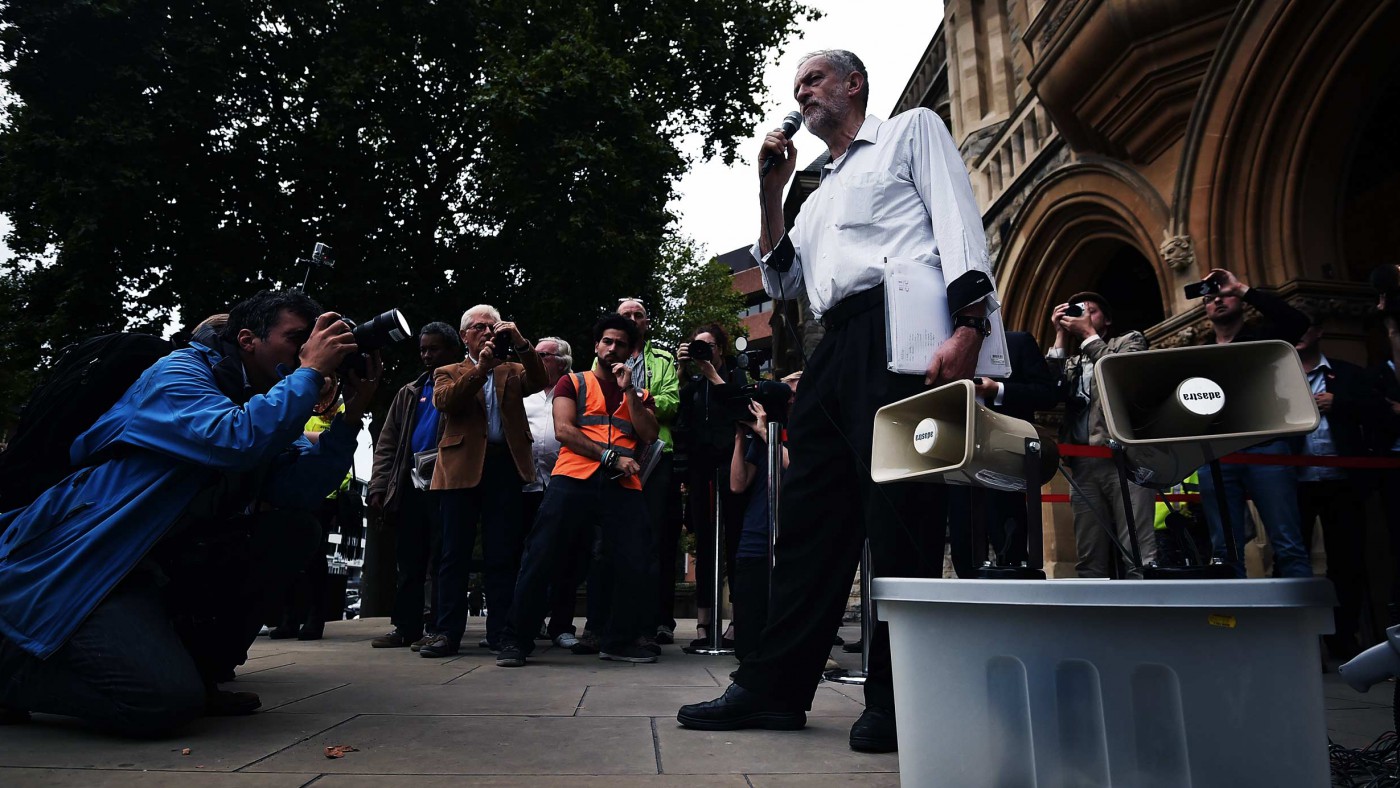Jeremy Corbyn is ahead in the Labour leadership contest for two reasons. First, he is voicing opinions shared by the majority of Labour members, not just the thousands of entryists who joined in the last few weeks. And second, because he represents a break with the scheming and manipulation of the Blair era, when politics was about creating an image and managing the party reputation by means of mass advertising techniques. Mr Corbyn speaks for authentic Labour, which is why the other candidates are struggling to explain what they don’t like about him.
Mr Corbyn wants Labour to be a party with a philosophy and a corresponding programme that seeks to win public support through persuasion. He does not want to lead a party of careerists who seek power for their own sakes. A famous book on propaganda from the 1920s, still being reprinted today, encapsulated the Blairite view: ‘Ours must be a leadership democracy administered by the intelligent minority who know how to regiment and guide the masses.’ Mr Corbyn rejects the politics of reputation management and prefers persuasive campaigning aimed at winning people over to his convictions.
This makes Mr Corbyn seem exciting and the others appear lacklustre. Above all, they have not offered a fundamental challenge to his programme. He seems to lack the political guile of a Blair or a Mandelson, while his rivals seem only to be saying that the voters are not ready yet. They could easily agree with his ultimate ends but feel that it is too soon to spill the beans to the voters. Liz Kendall finds Mr Corbyn unrealistic and insists that, if Labour is to help the most vulnerable in society, they must win power first. It all seems to be about tactics. Don’t frighten the voters by telling them what Labour really wants to do.
Alastair Campbell has taken the same line in the Telegraph, warning that Mr Corbyn’s policies will not be acceptable to voters in many constituencies. The implication is that he may have sound convictions but the voters are rather backward and so it’s best not to say too much at this stage. Corbyn is wrong but only because he is blurting it all out.
And yet there is a place for a party of the liberal left that renounces Blairite image-building without embracing the class-war doctrines that in truth are the essence of Mr Corbyn’s view. The rival candidates have not described this alternative because they either share Mr Corbyn’s beliefs or they don’t have any strongly-held ideals.
Here are four questions they could answer. First, do they think Britain is divided by social class and that the purpose of politics is victory over the class enemy? Or do they think the purpose of politics is, not to win victory over the enemy, but to win the opportunity of assuming a public trust on behalf of everyone. Such a view does not mean denying the existence of conflicts of interest; but it does mean believing that they can be reconciled with enough effort. Above all, it means deploying government to make it possible for everyone to develop their personal capabilities to the full.
It would renounce politics as a struggle for the right to exercise the powers of a temporary dictator. The legitimate alternative for the liberal left would be to advocate a politics that is a constant search for agreement through open discussion and a process of seeking public policy solutions that everyone can live with. It would be about the common good and the public interests that we all share.
This view leaves room for a party whose priority is to support the poorest in society but it rules out class antagonism and its modern variant, victim-based sectarianism. Such a party would ask: ‘Who is not flourishing at present and can the government help?’ Above all, it would want to ensure that everyone who works hard can develop their abilities to the full and earn a good living.
Second, are the candidates at ease with private enterprise, private profit and competition? Andy Burnham has made it clear that within the NHS he regards private provision as almost always undesirable. He prefers government ownership. He also opposes profit making within the NHS. He appears to think it is always wrong and prefers the public service ethos. And he thinks competition is harmful or wasteful or both. He chooses to contrast it with co-operation, when its opposite is not collaboration with other people but monopoly. These are not only pre-Blair doctrines, they are the central tenets of pre-war socialism. How far back is Labour travelling?
Third, what kind of welfare system does Labour seek? Beveridge advocated a welfare backstop at subsistence level. For many years Labour advocated a national guaranteed minimum. Under Blair and Brown it moved closer towards compulsory redistribution from rich to poor in order to equalise for its own sake, moving not towards total equality of income but compressing the difference between the top earners and the lower earners as a matter of ideology. And it had not escaped their attention that creating a bloc of voters beholden to the state for their income would come in handy at election time.
Fourth, do Labour’s would-be leaders want to support private enterprise or control it? Mr Corbyn is clearly at the ‘command and control’ end of the continuum. There is plenty of space for an activist industrial strategy to encourage high-paid jobs in manufacturing while being unambiguously in support of free enterprise. Is that where the others stand?
The candidates need to make it clear whether their policy objectives are those of the antagonistic left or the liberal left. Until they can explain how the liberal left differs from Mr Corbyn’s class war, they are likely to lose.


